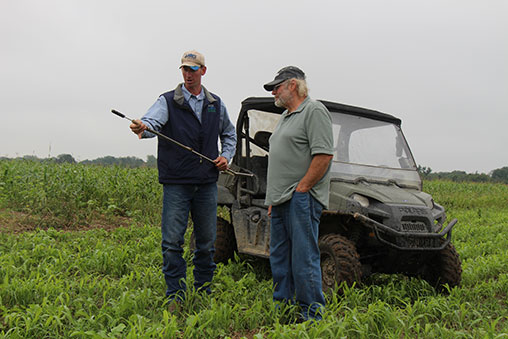Feb 14, 2019Help for Michigan growers for soil testing, nutrient use at Lake Erie
A new program will provide reimbursements to Michigan farmers near the Western Lake Erie Basin (WLEB) who improve soil testing and nutrient application.
Soil Testing to Reduce Agriculture Nutrient Delivery (STRAND), a partnership between the Michigan Farm Bureau (MFB), the Michigan Department of Agriculture and Rural Development (MDARD) and 14 other organizations, will help farmers make informed decisions about nutrient applications to cropland based on soil testing
According to MDARD Director Gary McDowell, the program will help address the amount of phosphorous entering Lake Erie.
“We are really excited about this program,” MDARD Director Gary McDowell said in a statement. “Farmers will be able to test and incorporate new technologies into their farming practices. These will help to address the issues of phosphorus loading in Lake Erie. It can help farmers conduct precise soil analysis, which can result in more efficient fertilizer use.”
According to MDARD, farmers can implement one or more of the following nutrient management practices:
- Grid/zone sampling and nutrient management planning
- Variable rate application or subsurface placement
- Yield monitor calibration and evaluation of nutrient management with Michigan State University Extension
- Equipment/upgrades that will assist with nutrient placement (nitrogen and/or phosphorus), subsurface placement, or yield monitoring
Laura Campbell, manager of the ag ecology department at the MFB, said the program is available for any farmer in the Michigan portion of the Western Lake Erie Basin.
“We were able to help create a program that is straightforward, has an easy application process through farmers’ local Conservation Districts, provides fast turnaround for payments, and allows cost share on a variety of new practices and equipment: plans for nutrient management, grid or zone soil testing, variable rate and/or incorporating nutrients, and even nutrient mapping and yield analysis,” she said.
“There is even funding to help farmers with equipment purchases to help them upgrade their practices.”
According to MDARD, agricultural runoff, such as phosphorus from fertilizer, is one of many known causes of algal blooms in Lake Erie. To reduce phosphorus runoff, STRAND will work with farmers to increase adoption of grid/zone soil testing, precision nutrient application and other management practices.
Funding for this program come from an EPA Great Lakes Restoration Initiative grant. All farmers in the WLEB are eligible. Funding will be available on a first-come, first-serve basis until funds are expended.
For more information or to apply, contact your local conservation district.















